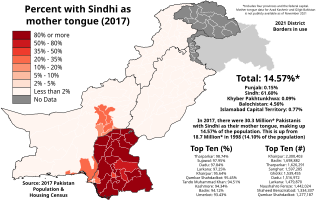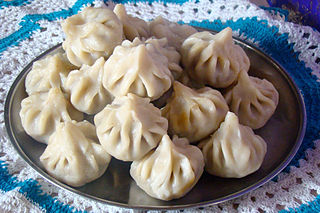
Sindhi pulao is a type of rice pilaf, prepared with mutton, beef, or chicken. It is prepared by Sindhi people in their marriage ceremonies, condolence meetings, and other occasions. [1] [2]

Sindhi pulao is a type of rice pilaf, prepared with mutton, beef, or chicken. It is prepared by Sindhi people in their marriage ceremonies, condolence meetings, and other occasions. [1] [2]

Sindh is a province of Pakistan. Located in the southeastern region of the country, Sindh is the third-largest province of Pakistan by land area and the second-largest province by population after Punjab. It is bordered by the Pakistani provinces of Balochistan to the west and north-west and Punjab to the north. It shares an International border with the Indian states of Gujarat and Rajasthan to the east; it is also bounded by the Arabian Sea to the south. Sindh's landscape consists mostly of alluvial plains flanking the Indus River, the Thar Desert of Sindh in the eastern portion of the province along the international border with India, and the Kirthar Mountains in the western portion of the province.

Sindhi is an Indo-Aryan language spoken by about 30 million people in the Pakistani province of Sindh, where it has official status. It is also spoken by a further 1.7 million people in India, where it is a scheduled language, without any state-level official status. The main writing system is the Perso-Arabic script, which accounts for the majority of the Sindhi literature and is the only one currently used in Pakistan. In India, both the Perso-Arabic script and Devanagari are used.

Roti is a round flatbread originating from the Indian subcontinent. It is commonly consumed in many South Asian, Southeast Asian, Caribbean, and Southeast African countries.

Sindhis are an Indo-Aryan ethnolinguistic group, originating from and native to the Pakistani province of Sindh, who share a common Sindhi culture, history and language. The historical homeland of Sindhis is bordered by the southeastern part of Balochistan, the Bahawalpur region of Punjab and the Kutch region of Gujarat.

Makar(a) Sankranti, also referred to as Uttarayana, Makar, or simply Sankranti, is a Hindu observance and a festival. Usually falling on the date of 14 January annually, this occasion marks the transition of the sun from the zodiac of Sagittarius (dhanu) to Capricorn (makara). Since the sun has made this transition which vaguely coincides with moving from south to north, the festival is dedicated to the solar deity, Surya, and is observed to mark a new beginning. Many native multi-day festivals are organised on this occasion all over India.

Pilaf, pilav or pilau is a rice dish, usually sautéed, or in some regions, a wheat dish, whose recipe usually involves cooking in stock or broth, adding spices, and other ingredients such as vegetables or meat, and employing some technique for achieving cooked grains that do not adhere to each other.

Biryani is a mixed rice dish, mainly popular in South Asia. It is made with rice, some type of meat and spices. To cater to vegetarians, in some cases, it is prepared by substituting vegetables or paneer for the meat. Sometimes eggs and/or potatoes are also added.

The Flinders Ranges are the largest mountain ranges in South Australia, which starts about 200 km (125 mi) north of Adelaide. The ranges stretch for over 430 km (265 mi) from Port Pirie to Lake Callabonna.
Leigh Creek is a former coal-mining town in eastern central South Australia. At the 2016 census, Leigh Creek had a population of 245, a 55% decrease from 550 in the previous census in 2011.
Maharashtrian or Marathicuisine is the cuisine of the Marathi people from the Indian state of Maharashtra. It has distinctive attributes, while sharing much with other Indian cuisines. Traditionally, Maharashtrians have considered their food to be more austere than others.

Sindhi cuisine refers to the distinct native cuisine of the Sindhi people from Sindh, Pakistan. Sindhi cuisine has been influenced by Central Asian, Iranian, Mughal food traditions. It is mostly a non-vegetarian cuisine, with even Sindhi Hindus widely accepting of meat consumption. The daily food in most Sindhi households consists of wheat-based flat-bread (Mani) or rice accompanied by two dishes, one gravy and one dry with curd, papad or pickle. Freshwater fish and a wide variety of vegetables are usually used in Sindhi cuisine. Restaurants specializing in Sindhi cuisine are rare, although it is found at truck stops in rural areas of Sindh province, and in a few restaurants in urban Sindh.
Sindhi folk music is traditional folk music and singing from Sindh, which is sung and generally performed in 5 genres that originated in Sindh, the first genre "Bait" styles. The Bait style is vocal music in Sanhoon and Graham. Second style "Waee" instrumental music is performed in a variety of ways using a string instrument. Waee, also known as Kafi. Sindhi folk music was popularized by great Sindhi sufi poet Shah Abdul Latif Bhitai.
Aroona is a suburb of Caloundra in the Sunshine Coast Region, Queensland, Australia. In the 2021 census, Aroona had a population of 3,466 people.

Modak (Marathi: मोदक) or Modakam (Sanskrit: मोदकम्), Modak in Kannada also referred to as Koḻukattai (கொழுக்கட்டை) in Tamil, and Kozhukkatta (കൊഴുക്കട്ട) in Malayalam is an Indian sweet dish popular in many Indian states and cultures. According to Hindu and Buddhist beliefs, it is one of the favourite dishes of Ganesha and the Buddha and is therefore used in prayers. The sweet filling inside a modak consists of freshly grated coconut and jaggery, while the outer soft shell is made from rice flour or wheat flour mixed with khowa or maida flour.
Sindhis in India refer to a socio-ethnic group of people living in the Republic of India, originating from Sindh. After the 1947 Partition of India into the dominions of new Muslim-majority Pakistan and remaining Hindu-majority India, a million non-Muslim Sindhis migrated to independent India. As per the 2011 census of India, there are 2,772,364 Sindhi speakers in the Indian Republic. However, this number does not include ethnic Sindhis who no longer speak the language.
Mukhi (mukhia) is the title used for a head of community or village elites and their local government in Western India and Sindh. It is derived from the word mukhiya meaning 'foremost', and prior to Indian independence they were the most powerful person in each community, imbued with both civil and judicial powers.
Aroona Dam is a reservoir in the Australian state of South Australia located in the gazetted locality of Leigh Creek about 5 kilometres (3.1 mi) west of the locality’s town centre.
Abdul Qadir Junejo was a novelist, playwright and columnist who wrote in Sindhi, Urdu and English.

Folk dances of Sindh are the traditional dances of the Sindhi people, which are indigenous to Sindh region which is now in Pakistan. These dances are performed at various events including marriages, ceremonies, special occasions, on birth of a child and for cultural purposes.
The crafts of Sindh and its craftsmen are held in high esteem and their works are notable not only in Sindh but also in many other places.